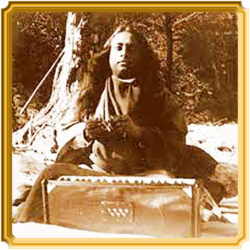
For the first 18 years in America (1920-1938) there was no Cosmic Chant book to tell the disciples which notes to sing. The disciples had to listen carefully to the Master and sing the chants from memory.
Durga Mata records: “The first notes to a few of his chants were written by Minie Christmas Mayo’s son, during Master’s absence in India in 1935-1936. Though some chants in the present chant book [1938] are not right, still it is something. That is why Master said, after he came back from India, ‘Duj (Durga Mata) has kept my chants alive [by playing them correctly].’”
For a long time Yogananda had wanted to publish the Cosmic Chants book. Finally, in 1938, he managed to do so. In his Autobiography of a Yogi he describes that special event:
“Many happy months sped by; in the peace of perfect beauty I was able to complete at the hermitage a long-projected work, Cosmic Chants. I set to English words and Western musical notation about forty songs, some original, others my adaptations of ancient melodies. Included were the Shankara chant, “No Birth, No Death”; two favorites of Sri Yukteswar’s: “Wake, Yet Wake, O my Saint!” and “Desire, my Great Enemy”; the hoary Sanskrit “Hymn to Brahma”; old Bengali songs, “What Lightning Flash!” and “They Have Heard Thy Name”; Tagore’s “Who is in my Temple?”; and a number of my compositions: “I Will be Thine Always,” “In the Land Beyond my Dreams,” “Come Out of the Silent Sky,” “Listen to my Soul Call,” “In the Temple of Silence,” and “Thou Art my Life.”
For a preface to the songbook I recounted my first outstanding experience with the receptivity of Westerners to the quaintly devotional airs of the East. The occasion had been a public lecture; the time, April 18, 1926; the place, Carnegie Hall in New York.
“Mr. Hunsicker,” I had confided to an American student, “I am planning to ask the audience to sing an ancient Hindu chant, ‘O God Beautiful!’”
“Sir,” Mr. Hunsicker had protested, “these Oriental songs are alien to American understanding. What a shame if the lecture were to be marred by a commentary of overripe tomatoes!”
I had laughingly disagreed. “Music is a universal language. Americans will not fail to feel the soul-aspiration in this lofty chant.”
During the lecture Mr. Hunsicker had sat behind me on the platform, probably fearing for my safety. His doubts were groundless; not only had there been an absence of unwelcome vegetables, but for one hour and twenty-five minutes the strains of “O God Beautiful!” had sounded uninterruptedly from three thousand throats. Blasé no longer, dear New Yorkers; your hearts had soared out in a simple paean of rejoicing! Divine healings had taken place that evening among the devotees chanting with love the Lord’s blessed name.”
